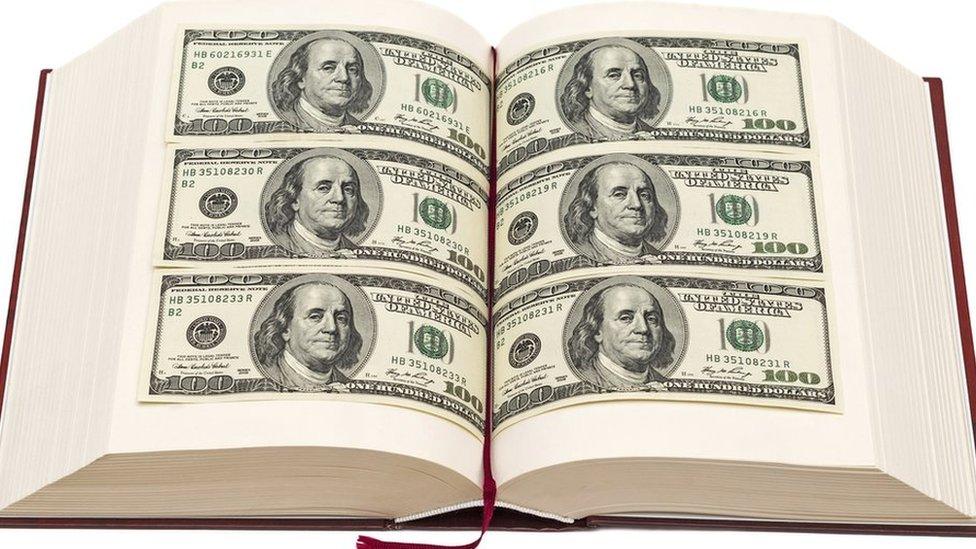Can podcasts turn a profit?
- Published

People are enjoying a wave of new, meticulously produced podcasts
For most of its short history, podcasting has been a largely amateur business, with few signs that it might become a mass medium that would prove attractive either to advertisers or subscribers. Then Serial changed all that.
The true-life crime series about a murder and a possible miscarriage of justice attracted hundreds of millions of downloads - and transformed the way advertisers saw podcasting.
This year, in the UK, a podcast called Untold: The Daniel Morgan Murder, external has been another unexpected hit, telling the story of the unsolved 1987 killing of a private detective, and allegations of corruption among police officers and newspapers. This 10-part series took six months to put together and only got off the ground due to a crowdfunding effort which raised nearly £10,000.
But as it became clear that it was going to be a hit, its creator Peter Jukes was approached by a firm called Acast, which has a bold mission to revolutionise the economics of podcasting. Founded in Sweden three years ago, Acast has rapidly become a leading global platform for podcasts, used by the likes of Buzzfeed and the Financial Times.

Untold: The Daniel Morgan Murder is a true-crime podcast that tells the story of an unsolved 1987 killing
It quickly found a sponsor for Untold, but that, according to Acast's founder, is the bare minimum any successful podcast should target when it is looking to monetise its product. In an interview for today's Tech Tent, Mans Ulvestam told me the reason he and his colleagues set up the business was that they thought podcast economics were broken - "it's been an amateur landscape".
Yet they saw great potential in a medium which was far more immersive than many others: "Radio and TV are often on in the background, podcast listeners only listen to things they like when they have time to listen."
Tailored ads
What they thought was needed was a far more sophisticated form of advertising than "this podcast is brought to you by Wiggins Widgets", with ads that could be tailored to the individual. Mans said advertisers want to be able to tailor their campaigns according to who is listening, what their interests are and at what time they are listening.
So Acast has introduced what it calls dynamic advertising, which means different listeners may get different adverts, and those adverts may change over time. For the Untold podcast, it means early episodes, which did not earn anything for the producers, may now have advertising inserted.

These days, many listeners choose to tune in to podcasts downloaded via their smartphones
But as well as offering podcast producers better ways of attracting advertisers, Acast has a more ambitious plan for them - getting listeners to actually pay for their product. The subscription model involves getting people who are loyal listeners to particular podcasts to pay more for additional content.
"What we've found," explains Mans Ulvestam, "is many listeners are very happy to pay for the podcast they follow and like if they supply you with an extra episode, or other deeper content or, for instance, being able to binge-listen to all the episodes at once if you pay."
One example he cites is popular UK podcast The Football Ramble, external. Its listeners get weekly episodes for free but, once a month, they are invited to pay for a special programme, such as a documentary on Leicester City's season. It seems many have been prepared to pay up.

A podcast about football, The Football Ramble, publishes paid-for special editions every month
This is not a route the makers of the Untold podcasts have taken so far, but then Peter Jukes asserted their motive was not commercial. "We wanted to get a story out that nobody in the mainstream media was taking on," he said.
He is convinced that podcasting is now a better way than newspapers to reach younger audiences: "I asked a lecture hall full of students how many read a daily paper - three said yes. But when I asked them how many listened to podcasts, about 70% raised their hands."
The success of podcasts like Serial and Untold is helping to bring a new audience to this medium. But it is innovation in attracting revenue from the listeners that will support the revival of podcasting with firmer foundations.
You can listen to Tech Tent on the BBC World Service at 16:00 BST - or catch the podcast.
- Published9 February 2016
